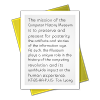Title
Widrow, Bernard oral historyCatalog Number
102746758Type
DocumentDescription
Bernard Widrow received SB, SM, and ScD degrees in electrical engineering from the Massachusetts Institute of Technology (MIT) in 1951, 1953 and 1956 respectively. He joined the MIT faculty in 1956. Thee years later, he moved to Stanford University and began research on adaptive filters, learning processes, and artificial neural models. in the autumn of 1959, together with Marcian "Ted" Hoff Jr. his first doctoral student at Stanford, he invented the LMS algorithm, which underpins much of modern digital communications.Prof. Widrow's research focuses on adaptive signal processing, adaptive control systems, adaptive neural networks, human memory, and human-like memory for computers. Applications include signal processing, prediction, noise cancelling, adaptive arrays, control systems, and pattern recognition.
In this interview, Dr Widrow discusses his early life; how he got into engineering, designing core memory for the Whirlwind computer at MIT;coming to Silicon Valley in the late 1950s, and creating systems and algorithms that can learn. In addition, he discusses his memories of MIT's Dr Norbert Wiener, his work with Ted Hoff Jr., the creation of the ADALINE neural network, adaptive antenna systems, and current work on integrating memory with learning.
Date
2013-04-13Contributor
| Fortier, James, Videographer |
| Hodge, Shayne, Interviewer |
| Widrow, Bernard, Interviewee |


